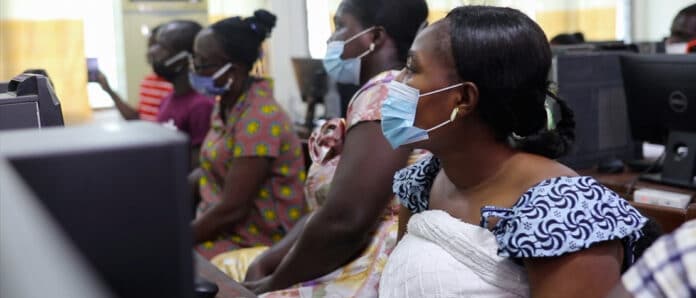A newly signed partnership between the International Telecommunication Union (ITU) and Norway will scale up and strengthen digital skills in Ghana. It focuses on training for underserved communities in the country. The partnership is a collaboration with Cisco and the Ghana Investment Fund for Electronic Communications (GIFEC).
The programme is a part of the Digital Transformation Centres (DTC) initiative. Its aimi is to provide 14,000 citizens in Ghana with job-ready digital skills. 200 training facilities will spread throughout the country.
Accelerating digital transformation through skills training
The Digital Transformation Centres Initiative was launched during ITU Telecom World 2019 in Budapest, Hungary. “The goal is to ensure that a lack of digital skills was no longer a barrier to participation in the digital economy,” ITU Secretary-General Houlin Zhao said.
Since then, DTCs in nine countries across Africa, the Asia-Pacific and Latin America have been delivering digital skills training. The aim is to enable women, students, youth, teachers and marginalized groups to develop digital capacities.
The COVID-19 pandemic shows the urgent need to develop digital skills and competencies. “Now the digital divide is wider than ever,” Aksel Jakobsen, State Secretary of International Development for the Norwegian Ministry of Foreign Affairs, affirmed.
Obstacle to distance learning
Even in developed countries, a lack of digital skills can prevent teachers and students from introducing distance learning. This is especially crucial during the pandemic, noted Ms. Bogdan-Martin.
“This is also a challenge for the business community. Most jobs require some level of digital skills, which will become more important as the world transitions to a post-digital age,” she added.
Participants from Switzerland, Norway, and Ghana participants could gather thanks to connectivity and technology. “Everyone should be able to interact like this,” Ghana’s Minister of Communications Ursula Owusu-Ekuful declared.
Why Ghana?
The partnership benefits from collaboration with GIFEC, the designated Digital Transformation Centre partner in the country. It has an existing network of local centres to provide capacity and infrastructure to train thousands of citizens.
Minister Owusu-Ekuful recounted some of GIFEC’s additional digital transformation achievements. This includes the provision of connectivity to 2000 communities since 2017, enhancing lives of 1.2 million citizens in rural Ghana.
However, digital transformation initiatives will not be available to those without the right skills and infrastructure to use them, the Minister explained. This includes the Ghana.gov payments, national e-ID system, or Ghana’s digital property address system
“I am certain that this programme will benefit trainees in various forms. As a Ministry, it will help us retool and revive our community ICT centres across the country,” she added.
According to Minister Jakobsen Digital Transformation Centres in Ghana will be important vehicles for rolling out digital goods. “With vast potential for assisting in development for new public goods and adjusting solutions to local contexts.” The project will add value to Norway’s contribution to vocational education in Ghana, he explained.
Both Ministers and ITU Secretary-General Zhao held up the signed agreement in a virtual ceremony to show their solidarity and commitment to close the digital divide together.
On the ground impact
The President of Cisco’s Europe, Middle East, Africa and Russia region Wendy Mars commended the Ghanaian government. It is “leaning in to get citizens on board with skills and abilities in digital technologies.”
Ms. Mars was referring to citizens like Sekina Isaah, a fashion designer and participant in the DTC initiative. She attested to the efficacy of the programme. She explained how she uses digital technology to follow friends within and beyond her community. Also she develops new ideas to grow her business. “I recommend it for anyone to build their skills,” she added, thanking all partners who contributed to her training.
According to DTC trainer Emmanuel Ayitey-Adjin, the programme has been especially beneficial for communities. “To learn about operating systems on different computers. As a trainer I have been able to tell them about Windows, Linux and Mac operating systems. I am grateful to Cisco and GIFEC for making the Digital Transformation Centres available to us.”
A call to follow suit
Mr. Zhao reminded the signing ceremony audience that only 10 years remain to respond to United Nations Secretary General Antonio Guterres’ expectation to connect everyone by 2030.
From the beginning of the pandemic, the ITU Secretary-General has called on all stakeholders to encourage conditions for investment. It should meet the needs and expectations of the unconnected in terms of connectivity, security, affordability and digital literacy.
“Today Ghana and Norway answered that call,” affirmed Mr. Zhao. He called on more developed countries to take the initiative and support similar digital transformation programmes.
“Digital inclusion is one of the most defining and urgent issues of our time. It is at the heart of the Sustainable Development Goals (SDGs). I hope others will follow the example of Norway and Ghana and join the ITU Digital Transformation Centre initiative,” he concluded.
Learn more about the Digital Transformation Centre initiative here.






